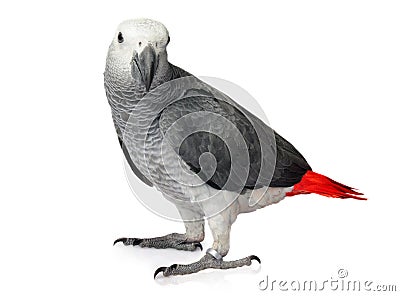
Download - Royalty Free Stock Images
from © Dreamstime.com
Hand rearing a baby African Grey Parrot or any other bird for that matter, is a risky thing to do if you don't know what you are doing. It takes a lot of dedication and it can be difficult.
If you don't have the experience of hand rearing, you should not attempt to buy a parrot or any other bird. You could possibly injure the bird or even kill it. I would advice most people to purchase a bird that has been weaned.
You might pay less to get a week old baby just for the hand rearing experience but the additional expenses will probably be a lot more than you bargained for. The formula made for hand rearing baby African Grey parrots, a brooder and a few syringes are to name a few.
Then there is the risk that the new baby will likely not make it. You will have to keep record of every feeding, weigh the baby on a continual basis, this is very important when hand rearing. Everything should be kept very sterile, as the baby has no immune system yet.
The formula has to be the right temperature and of the right consistency, to cold and thick can result in meals remaining in the crop and causing harmful bacteria to grow. To hot can cause crop burn, too runny a mixture will cause malnutrition.
You need to know how to open the African Grey baby's beak, if you do not; you could injure the beak and cause deformities. This is why hand rearing is so crucial to raise a healthy parrot. It may seem that a parrot has a hard beak, and adult parrots do but babies do not.
Then there's ensuring that baby does not get to hot or too cold, both is disastrous and can have fatal outcomes. The baby cannot control his body temperature therefore, you need to do that for him as you have decided on hand rearing him. That means a constant check must be done, and you have to know the signs of being too hot or cold.
You will need to know how much formula to give the baby parrot, and when to present solid foods. You will need to know what to give the baby parrot to ensure that he gets just enough nutritional vitamins and minerals. As too little or too much could lead to a number of different health problems later.
Hand rearing does not take a couple of days, but rather weeks. It will demand a lot of your time and you need to be very patient. Never the less, should you decide on hand rearing a baby African Grey Parrot; all this will be a be rewarded when your baby parrot is a healthy and well adjusted adult parrot.
I would advice that you get a baby parrot from two weeks, hand rearing from this age is a lot easier. Follow the advice of the breeder and your avian professional. Tell your avian specialist that you are hand rearing and to show you how to feed your baby parrot. Some breeders give the baby parrot to someone with hand rearing experience to raise the baby, they might not know how to feed your baby parrot.
When planning to buy a baby parrot regardless of how young or old there are a few things you need to look at. Most important is make sure that it is a reputable breeder.
The cages should be clean and the other birds should be in a really good condition. Ask the breeder what is the baby parrot eating and keep to that diet for a week or two and little by little introduce various other foods.
Ask questions about the parents, ask to see them. You should not accept a parrot if he shows any symptoms of illness, faeces on the tail or anal area if it is a baby, if they seem to be lethargic, have fluffed up feathers, if they screech when any one approaches them. If they are not completely alert and are clumsy.
Parrots have an instinctive need to conceal their illness but there are a few things like the above that give us an indication that everything is not fine. If after reading this article you still are considering on hand rearing a baby parrot, go to my blog, which will provide the information on hand rearing that could be of some help.

